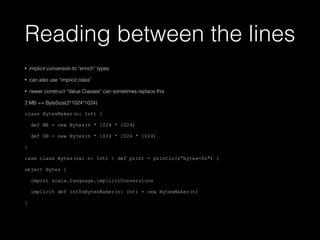Building DSLs with Scala
- 1. Building DSLs with Scala Mohit Jaggi Code Ninja and Big (Data) Troublemaker Ayasdi
- 2. Who am I? • Software engineer and architect • Past life: built networking, security and application delivery appliances using ASICs, microcode, C, some C++. Operating system optional. • This life: distributed systems, (big) data analytics, machine learning using Java and Scala. And real servers with a proper operating system!
- 3. Why I love Scala? • Less red tape • Multi-paradigm • Exploits the Java ecosystem • Static typing and type inference • Same language for everybody from casual script writer to application programmer to library designer
- 4. Who will find this useful? • Beginner to intermediate scala programmers • If you write code, you have APIs • Library designers
- 5. Agenda • Motivation for DSLs • Scala Constructs useful for DSLs • Lessons from my limited experience
- 6. Motivation for DSLs • API Design Considerations • DSL • Types of DSLs and tradeoffs
- 7. Considerations for a good API • sufficient for current needs • extensible for anticipated needs • does not preclude unanticipated needs • forward/backward compatibility • easy to use • little or no documentation required, but • complete documentation available
- 8. DSL • Domain Specific Language • helps with ease of use part • e.g. SQL, R, jooq, bigdf
- 9. Types of DSLs • External or standalone • Internal or embedded
- 10. External DSL • New language from “scratch” • Write a parser using something like lex/yacc, antlr • Write an interpreter or • Write a code generator • Manage a run-time environment(Java?, native?, REPL?)
- 11. Internal DSL • “internal” or “embedded” in a general purpose programming language • Designed to “feel like” a different language more intuitive to the domain • e.g. Jooq in Java/Scala feels like SQL
- 12. Tradeoffs • Less work • More completeness • Less syntax flexibility • “global optimizations” hard • Error messages less meaningful • More freedom in syntax • More “global optimizations” possible • Possible to have better error messages • More work • Typically slower without good code generation I n t e r n a l E x t e r n a l Benefit Cost
- 13. Why Scala for DSLs? select(BOOK.ID) from BOOK where BOOK.TITLE === “Scala scala” select(BOOK.ID).from(BOOK).where(BOOK.TITLE.equal(“Java java”))
- 14. Scala Constructs Useful For DSLs
- 15. Vanishing Method Call • apply() and update() can be called without naming them df(“age”) == df.apply(“age”) == df.column(“age”) df(“age”) = df(“age”) + 1 df.update(df(“age”), df(“age”) + 1)
- 16. Simulated dynamic typing • extend the Dynamic trait • hides compile errors, is it worth paying that cost? df.age == df(“age”) == df.selectDynamic(“age”) def selectDynamic(colName: String) = { val col = self.column(colName) if (col == null) logger.error(s"$colName does not match any DF API or column name") col } def updateDynamic(colName: String)(that: Column): Unit = update(colName, that) df.age = df.age + 1 df.updateDynamic(“age”)(age + 1)
- 17. Dial 0 for operator • dot is optional, so methods looks like operators • any symbol can be used as operator • for example to list people that can buy beer you can use df.where(df(“age”).gt(21)) df where (df(“age”) > 21)
- 18. • operator ending in colon applies to right operand, this provides more freedom (~active vs passive voice) object orange { def eat_:(who: String):Unit = println(s"$who is eating orange”) } “monkey” eat_: orange • careful with operators like ==, use === instead
- 19. Free companion object • hide “new” to make an object val df = DF.fromCSVFile(…) • also a good place to put implicit conversions in
- 20. Reading between the lines • implicit conversion to “enrich” types • can also use “implicit class” • newer construct “Value Classes” can sometimes replace this 2 MB == ByteSize(2*1024*1024) class BytesMaker(n: Int) { def MB = new Bytes(n * 1024 * 1024) def GB = new Bytes(n * 1024 * 1024 * 1024) } case class Bytes(val n: Int) { def print = println(s”bytes=$n") } object Bytes { import scala.language.implicitConversions implicit def intToBytesMaker(n: Int) = new BytesMaker(n) }
- 21. My name is Bond • Pass by name parameters are useful to pass in “blocks of code” def doTwice(action: => Unit) { action action } doTwice { println("hey") }
- 22. Multiple Parameter Lists • Help avoid unwanted commas and more intuitive parentheses/braces def when(predicate: => Boolean)(action: => Unit) = { if(predicate) action } when(1 == 1) { println(“1”) } instead of when(1 == 1, println(“1”))
- 23. FWIW - API • Don't provide unnecessary options, if needed you can always add more; like "salt in a dish", you can't remove it • Names meaningful to user not the coder • Consistent coding style • Option[T] if truly optional, else exception
- 24. FWIW - DSL • Don’t take it to extremes (like “Baysick”) • Assume users know some(or lot of) Scala • Try to generate useful error messages • Careful with ==, right associative operators, implicit search order • Aim to provide gentle slope to Scala instead of none; basic Scala is simple, your API users will appreciate it























![FWIW - API
• Don't provide unnecessary options, if needed
you can always add more; like "salt in a dish",
you can't remove it
• Names meaningful to user not the coder
• Consistent coding style
• Option[T] if truly optional, else exception](https://image.slidesharecdn.com/dsl-scala-151013204151-lva1-app6892/85/Building-DSLs-with-Scala-23-320.jpg)

